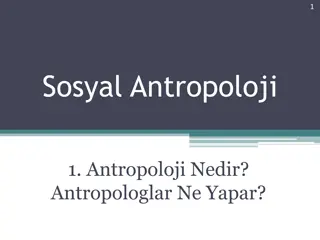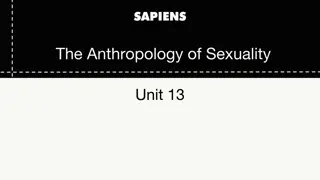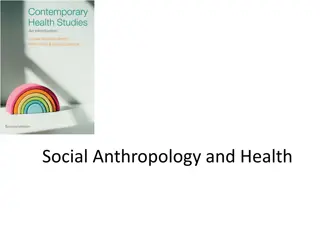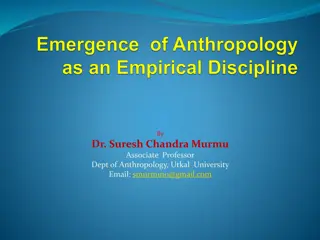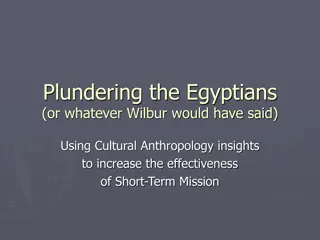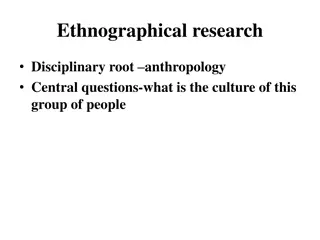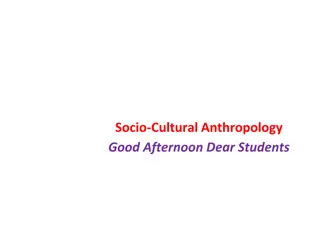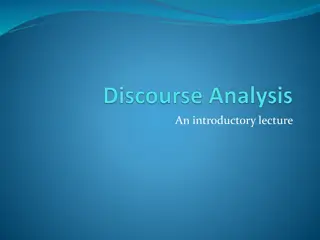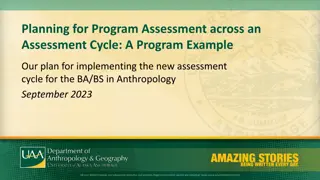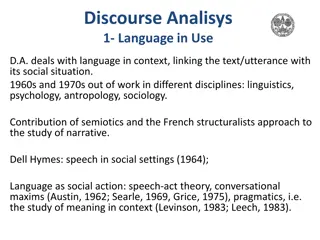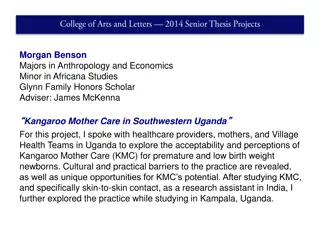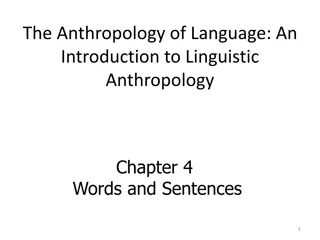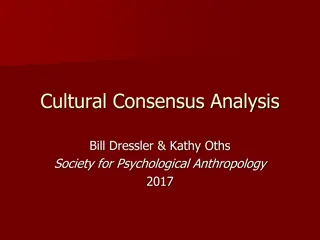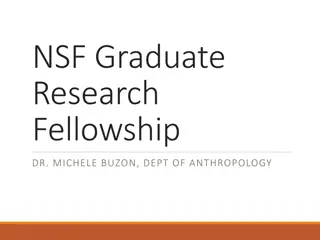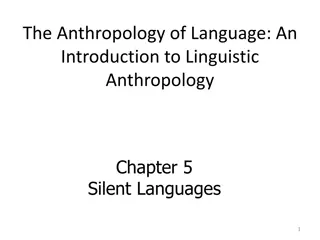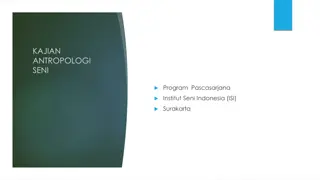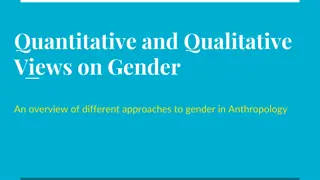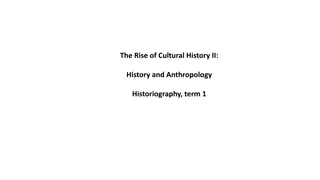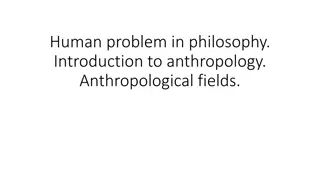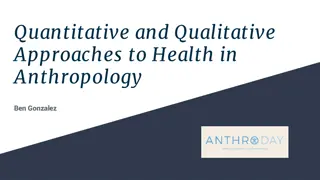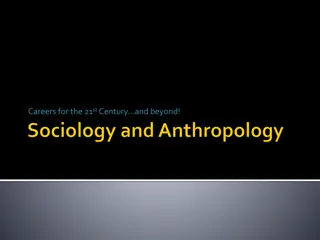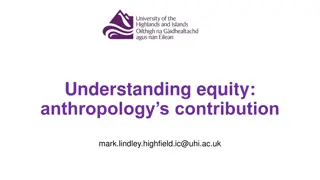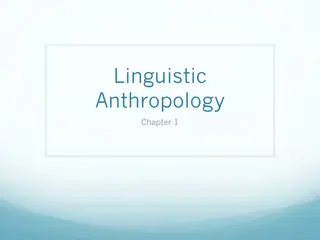Language Study Community – Enhance Your Language Skills
Joining a Language Study Group is a fantastic way to take your language learning to the next level. By leveraging the power of Group Study, you can immerse yourself in the language, enhance your understanding, and build confidence in your speaking abilities. Read full article \/\/explainlearning.com
1 views • 3 slides
Academic Language Demands and Supports in Instructional Planning
Academic Language Demands and Supports are crucial in educational settings to ensure comprehension and usage of language by students. This content discusses embedding language demands in lesson plans, providing language supports, and peer review activities to enhance academic language skills. The fo
6 views • 10 slides
The Significance of Media in Language Learning
Media plays a crucial role in language learning by raising awareness of the ideology behind linguistic structures and providing valuable information on society and culture. Linguists are drawn to media language for research purposes and to understand its impact on language use and attitudes. Media s
12 views • 5 slides
Understanding Translation: Key Concepts and Definitions
Translation involves transferring written text from one language to another, while interpreting deals with oral communication. Etymologically, the term "translation" comes from Latin meaning "to carry over." It is a process of replacing an original text with another in a different language. Translat
11 views • 76 slides
Comparative Sociology
Comparative Sociology is a specialized branch that compares societies to provide generalizations, focusing on the structure and jurisdiction of groups and organizations. It involves studying affinities and disparities to predict outcomes. The discipline is closely related to Social Anthropology. Com
3 views • 15 slides
Explore Anthropology and Sociology at Our Department
Anthropology and Sociology departments offer culturally relevant classes addressing key societal issues such as race relations, health, migration, and more. Meet our renowned faculty members specializing in various anthropological and sociological fields of study. From urban anthropology to gender i
3 views • 17 slides
Introduction to Anthropology: What Anthropologists Do
Anthropology is the study of human societies and cultures to understand the various aspects of human existence and connections between different elements. It encompasses physical anthropology, linguistic anthropology, cultural anthropology, and social anthropology, delving into topics such as evolut
3 views • 21 slides
Anthropology of Sexuality
Delve into the anthropology of sexuality, examining how cultural, social, and historical factors shape human sexual behaviors and identities. Explore the challenges of studying sexuality across diverse cultural settings, and discover the influences of religion, societal norms, family, and media on s
6 views • 9 slides
Understanding the Intersection of Social Anthropology and Health
Social anthropology investigates the cultural and social dimensions of health, providing insights into how illness and medical care are shaped by cultural contexts. This discipline explores the impact of culture on individual health, highlighting how collective beliefs influence perceptions of healt
0 views • 20 slides
Evolution of Anthropology: From Herodotus to Modern Times
Anthropology has evolved over centuries, with roots tracing back to ancient Greeks like Herodotus. The discipline developed into a scientific field during the European Enlightenment and has since progressed to study the science of humanity and cultural differences. Philosophers like Plato and Aristo
1 views • 40 slides
Enhancing Short-Term Mission Effectiveness Through Cultural Anthropology Insights
Utilizing insights from cultural anthropology, this presentation delves into defining culture for short-term missions, viewing culture in successive levels, and key concepts such as cultural evolution and relativity. It explores the impact of culture on individuals and missions, emphasizing the impo
0 views • 16 slides
Understanding Ethnographic Research in Anthropology
Ethnographic research in anthropology focuses on studying cultures through direct observation in natural environments. It aims to gain insights into how users interact with their surroundings, providing in-depth understanding of social interactions, behaviors, and perspectives. Methods include direc
0 views • 22 slides
Enhancing Language Learning Across the Curriculum in B.Ed. 1st Year Course
Language Across the Curriculum (LAC) emphasizes that language learning should occur across all subjects, not just in language classrooms. It highlights the importance of incorporating language development into every learning activity, fostering multilingualism in schools. Language plays a crucial ro
2 views • 34 slides
Introduction to Socio-Cultural Anthropology: Understanding Human Societies
Explore the holistic study of mankind in Anthropology, delving into various branches, perspectives, and the scope of Social Anthropology. Learn about the relationship of Social Anthropology with other disciplines and its significance in understanding human societies.
1 views • 9 slides
Understanding Discourse Analysis: An Overview
Discourse analysis is the study of language in use within its social context. It involves analyzing written or spoken language to understand how it is employed in real-life situations. This research method focuses on the purposes and effects of language, cultural conventions, communication of values
3 views • 22 slides
Understanding Craniofacial Superimposition Techniques in Forensic Anthropology
Craniofacial superimposition is a valuable technique used in forensic anthropology for identifying skulls by overlaying them onto photographs or videos of missing persons. The method involves various techniques such as Photographic Superimposition, Video Superimposition, and Roentgenographic Superim
6 views • 20 slides
Forensic Anthropology and Missing Persons Investigation
The investigation into missing persons using forensic anthropology techniques, focusing on the analysis of bones like the humerus for height approximation and identification. Families await closure as the FBI looks into washed ashore bones, potentially bringing answers and resolving insurance claims
0 views • 13 slides
Speech and Language Developmental Milestones: A Bilingual/Multilingual Perspective
Speech and language developmental milestones are crucial for children, regardless of their home language. These milestones encompass receptive language, expressive language, pragmatics, and articulation and phonology. Understanding how a child hears and talks from birth to one year is essential, as
1 views • 23 slides
Implementing New Assessment Cycle for Anthropology BA/BS Program
This plan details the implementation of a new assessment cycle for the BA/BS in Anthropology program at UA, focusing on key elements such as required coursework mapping, program student learning outcomes, assessment based on a 7-year schedule, and submission deadlines for reports. The program aims t
0 views • 7 slides
Sex Determination Through Bone Analysis in Forensic Anthropology
In forensic anthropology, the pelvis and skull are crucial in sex determination, with additional assistance from femur, tibia, and humerus measurements. This data sheet guides on circling male or female based on traits like sub-pubic angle, pelvic cavity shape, eye orbit sharpness, zygomatic process
0 views • 33 slides
Understanding Triad Tests in Cognitive Anthropology
Triad tests are a valuable tool in cognitive anthropology, originally introduced by George Kelly in 1955. They involve presenting individuals with sets of three items and eliciting responses based on similarity or dissimilarity. This method allows researchers to explore differences in cognition acro
1 views • 27 slides
Understanding Discourse Analysis: Language in Social Contexts
Delve into the realm of discourse analysis focusing on the connection between language usage and social settings from the perspectives of linguistics, psychology, anthropology, and sociology. Explore the works of key figures like Dell Hymes, M.A.K. Halliday, and the contributions of semiotics and Fr
0 views • 40 slides
Diverse Academic Projects in Anthropology, Design, and Political Science
Students undertook research projects in varied fields - from exploring Kangaroo Mother Care in Uganda to blending traditional handicraft techniques with modern design, and examining civic education's role in democracy. Each project reflects unique interests and experiences across anthropology, desig
0 views • 19 slides
The Anthropology of Language: Words and Sentences Overview
Explore the anatomy of language from morphology to syntax, delving into the structure of words, morphemes, and sentences. Understand the analysis of morphemes and their arrangements, the descriptions of bases forming words, kinds of bases like roots and stems, and creating a language from base forms
0 views • 31 slides
Understanding Cultural Consensus Analysis in Psychological Anthropology
Explore the essence of Cultural Consensus Analysis (CCA) as a significant aspect of psychological anthropology. Through ethnographic work and structured techniques, CCA helps verify shared knowledge within cultural domains and enhance the comprehension of cultural models. The model and steps involve
0 views • 64 slides
Exploring Sociolinguistics: Language Variation and Social Factors
Sociolinguistics delves into the study of language variation influenced by social factors, examining the relationship between language and its social context. It explores various aspects like standard pronunciation, language choice, speech acts, language components, language variety, and factors suc
0 views • 73 slides
NSF Graduate Research Fellowship - Dr. Michele Buzon, Department of Anthropology
The NSF Graduate Research Fellowship, overseen by Dr. Michele Buzon from the Department of Anthropology, offers a stipend of approximately $34,000 along with $12,000 for the institution. The fellowship is open to U.S. citizens, nationals, and permanent residents. Eligibility criteria include having
0 views • 4 slides
Understanding Assembly Language Programming for Computing Layers
Assembly language is a low-level programming language that enables direct interaction with a computer's hardware components. This content explores the fundamentals of assembly language, the relationship between human-readable machine language and binary code, an assembly language program for multipl
0 views • 31 slides
Understanding Language Anxiety in Foreign Language Learning and Teaching
Explore the impact of language anxiety on students and teachers in foreign language learning and teaching contexts through insights from Dr. Christina Gkonou's research. Delve into the theoretical background, implications for language education, and real-life experiences shared at the Essex Language
0 views • 25 slides
Exploring Silent Languages: Sign Language, Body Language, and Nonverbal Communication
Delve into the world of silent languages through an introduction to linguistic anthropology in Chapter 5. Explore the transmission of messages without spoken words, the intricacies of sign languages, gestures, body language, and nonverbal communication. Discover the unique syntax and complexity of s
0 views • 20 slides
Exploring Anthropology of Art: Perspectives and Studies on Cultural Expressions
This text delves into the intersection of anthropology and art, focusing on the importance of anthropological approaches in studying artistic subjects. It covers various topics such as the nature of art, methodologies, theoretical frameworks, and case studies. The discussed themes include the role o
0 views • 7 slides
Approaches to Gender Studies in Anthropology
This presentation provides an overview of qualitative and quantitative research methodologies in Anthropology focusing on Gender Studies. It explores topics like masculinity, homosociality, and gendered spaces, reflecting on the concepts of gender construction and performance. The research on frater
0 views • 13 slides
Cranio-Facial Superimposition Techniques in Forensic Anthropology
Cranio-facial superimposition is a technique used in forensic anthropology to identify a skull by overlaying an image of the skull onto a photograph or video of a missing person's face. This method involves various techniques such as photographic, video, and roentgenographic superimposition. The pro
0 views • 20 slides
The Rise of Cultural History II: History and Anthropology Historiography
This content explores the concepts of cultural history, Marxist thought, cultural hegemony, and the works of Antonio Gramsci. It delves into the history of anthropology, discussing key figures such as Franz Boas and Malinowski, and highlights the intersection of anthropology and history in understan
0 views • 9 slides
Understanding Human Nature Through Philosophy and Anthropology
Explore the different perspectives on human nature through philosophy and anthropology, from ancient Greek philosophers like Aristotle to modern thinkers like Freud and Sartre. Delve into the intersections of theology, psychology, and cultural relativism in shaping our understanding of what it means
0 views • 12 slides
Approaches to Health Disparities in Anthropology: Quantitative vs. Qualitative Methods
Exploring health in anthropology involves various factors like social, cultural, biological, and linguistic influences. This content delves into the quantitative research on disparities in health insurance coverage, particularly focusing on Latino vs. white respondents in Texas. The study utilized l
0 views • 13 slides
Building Your Ideal Career with a Sociology/Anthropology Degree
Discover the diverse career opportunities offered by a Sociology/Anthropology degree, including skills development, research capabilities, and the exploration of social processes. Learn to assess your skills, interests, work environment preferences, and sense of purpose to guide your career path. Em
0 views • 29 slides
Understanding Equity in Anthropology: Contributions and Challenges
Anthropology plays a crucial role in understanding and addressing issues of equity, particularly in education. In Scotland, initiatives such as the Scottish Attainment Challenge and Pupil Equity Funding aim to bridge the gap in educational outcomes for pupils from disadvantaged backgrounds. While th
0 views • 16 slides
Understanding the Body, Soul, and Spirit Paradigm in Human Existence
Exploring the concept of ternary anthropology introduced by French anthropologist Michel Fromaget, which views humans as composed of body, soul, and spirit. This paradigm, rooted in both Eastern and Western traditions, delves into the ontological value of the mind and the overall human experience. T
0 views • 36 slides
Understanding Linguistic Anthropology and Anthropology: A Comprehensive Overview
Delve into the realm of linguistic anthropology and anthropology to explore the study of humans, culture, language, biology, artifacts, and more. Discover the four fields of anthropology, the holistic approach, and the importance of cultural relativism while avoiding ethnocentrism. Learn how linguis
0 views • 25 slides






